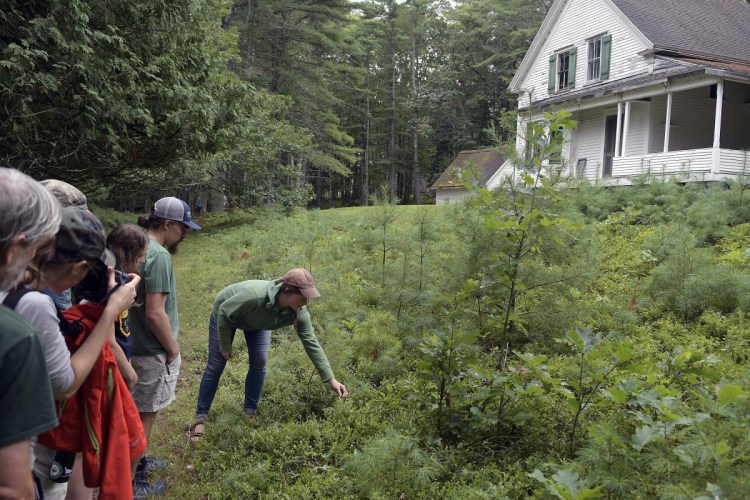SWAN ISLAND — For much of her life, Jenna Rozelle-Darcy couldn’t imagine killing an animal.
That started to change in her early 20s, when she was living on a homestead in Washington County and trying to provide as much of her own food as possible. She started by hunting small game such as squirrels and snowshoe hares, then graduated to whitetail deer. She’s also tried, unsuccessfully, to bag a moose.
While Rozelle-Darcy, now 33, has learned plenty of skills on her own, she’s also had help from more experienced hunters. Her latest lesson came this past weekend, when she was helping run a weekend of outdoors workshops on Swan Island, between Richmond and Dresden.
During those workshops, a Massachusetts man demonstrated how to use a tree saddle, a newer technology that uses straps to harness a hunter to a tree, affording an open view of the ground below. It’s an alternative to tree stands, which are solid platforms that serve the same purpose and have been used for many years.
Now Rozelle-Darcy is interested in getting a tree saddle for herself, and she has made plans to work with the Massachusetts man to learn more about them. She harvests mushrooms and other wild food for a living and said she could easily carry a saddle in her backpack when she’s out foraging.
“It’s a versatile, light way to get up a tree,” she said. “It’s my style. Tree stands are cumbersome, clunky and expensive, and require cutting limbs off trees.”
That free exchange of ideas was one of the reasons that more than 40 people from as far away as Rhode Island and Connecticut came to Swan Island this past weekend. Almost all of them belong to the New England chapter of Backcountry Hunters and Anglers, a national organization that tries to preserve public access to land for hunting and fishing.
Now the New England chapter is launching a program that it hopes will make it easier for people to learn how to hunt and fish, whether they come from a long line of sportsmen or haven’t touched a bow, rifle or rod since they were in summer camp.
The program will pair the less experienced with veteran mentors who can answer any questions they have, from how to get up into trees to where they can practice casting a fly rod.
So far, about 20 members have volunteered to be mentors, said Rozelle-Darcy, a board member of the New England chapter who is helping to organize the mentorship program.
“They’re exceptionally helpful, and love to offer little tips,” Rozelle-Darcy said of the group’s members. “Even if it’s just a little advice through email, it can really speed up your learning curve.”
Over the weekend, Rozelle-Darcy taught a workshop on foraging, in which she provided a guided tour of Swan Island, a state conservation area in the middle of the Kennebec River, at the head of the ecologically bountiful Merrymeeting Bay. She stopped at various fauna, describing their tastes and dishes that could be made from them.
On one tour, she said that yellow sorrel – a plant with clover leaves and small yellow flowers – has a tart, lemony taste and can be made into sorbet. She said reindeer lichen – which grows in light, mint-green patches – is high in acidity, but that the acid can be neutralized by boiling it with baking soda.
She warned that one type of mushroom tastes like “a mix of cinnamon and dirty socks,” but added, “It’s weirdly delicious.”
In other workshops over the weekend, attendees were able to learn map and compass skills, build their own knives, set up tree stands, and practice shooting arrows at three-dimensional targets.
Rozelle-Darcy was first drawn to Backcountry Hunters and Anglers, she said, because it strikes a nice balance in its advocacy for environmental causes that are ethical and overlap with the interests of hunters.
On Sunday, multiple visitors to the island echoed that point. One of them, Heather Kusmierz, 36, of New Hampshire, said that she is “brand new to hunting.”
She got interested in it only recently, she said, after she started learning archery for fun and decided to use that skill to get food.
She’s now being mentored by two more experienced hunters through the Backcountry Hunters and Anglers program, and said they have helped her in a number of ways, such as when her bow broke and she needed advice on fixing it, or when she needed suggestions on the best type of camouflage clothing.
Send questions/comments to the editors.



